The Author
Violette Shamash (née Ishayek)
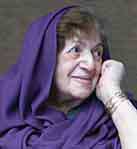
 VIOLETTE SHAMASH was born in Baghdad in 1912 and lived with her five sisters and brother on the banks of the Tigris in a ‘palace’ (qasr) built by their father, Menashe Ishayek, a respected merchant, banker and savant. She grew up in Arcadian conditions, a cultured and educated young lady witnessing Mesopotamia’s development into the country that became Iraq.
VIOLETTE SHAMASH was born in Baghdad in 1912 and lived with her five sisters and brother on the banks of the Tigris in a ‘palace’ (qasr) built by their father, Menashe Ishayek, a respected merchant, banker and savant. She grew up in Arcadian conditions, a cultured and educated young lady witnessing Mesopotamia’s development into the country that became Iraq.
At home, Violette learned to honour the traditions of her faith while absorbing the history of her people, whose origins stretched back to the days of Babylon. Like other girls of her class, she attended the Alliance Française school, and later as a young woman enjoyed shopping at the city’s very first department store, Orosdi Back, and experimenting with western fashions… a daring concept at the time.
Baghdad was only slowly adapting to the modern world, so when she and her younger sister Daisy went to Palestine to see their elder sister, Fahima, who had settled in Tel Aviv, the experience was liberating. They stayed there from 1933 to 1934 when this portrait (above, right) was taken, and felt very emancipated. It was the first time they had come across a liberal way of life.
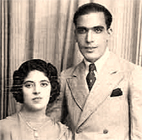 In 1937 she was introduced to Dahoud (David) Shamash, and they married (this is their engagement photo, right). A daughter, Lena, was born in 1938, followed by another girl, Mira, in 1941. It was the month of May, a time of blackouts and curfews due to the war which had erupted between Britain and the pro-Nazi junta leader, Rashid Ali. Two weeks later, on the Jewish holy festival of Shavuot (Pentecost), came the Farhud. Violette recalls the entire family sheltering in the basement in the dark, listening all night long to the distressing screams of women shouting and calling the names of their loved-ones being murdered.
In 1937 she was introduced to Dahoud (David) Shamash, and they married (this is their engagement photo, right). A daughter, Lena, was born in 1938, followed by another girl, Mira, in 1941. It was the month of May, a time of blackouts and curfews due to the war which had erupted between Britain and the pro-Nazi junta leader, Rashid Ali. Two weeks later, on the Jewish holy festival of Shavuot (Pentecost), came the Farhud. Violette recalls the entire family sheltering in the basement in the dark, listening all night long to the distressing screams of women shouting and calling the names of their loved-ones being murdered.
Miraculously, they escaped, thanks to the kindness of a Muslim neighbour. But for Violette and David it was the beginning of the end. With their three-year-old daughter, Lena, and six-month old baby, Mira, they fled, moving first to India, then Palestine (where a son, Simon, was born in 1945), Cyprus, the new State of Israel, and finally London in 1964.
Ten years later, David died. For the next thirty-two years Violette lived alone, in the same London apartment, and as the last decade brought Baghdad back into the headlines once more she closely followed the continuing saga of Iraq and the fate of Saddam Hussein via satellite television. ‘My mind turned to another era,’ she wrote, ‘for I was born a quarter of a century before Saddam, before the creation of Iraq…
‘I saw my country emerge from a primitive past in to what promised to be a brilliant future. It was my Baghdad, my native land where I grew up, happy and privileged, in a Jewish community living harmoniously with our Muslim neighbours. My Baghdad was beautiful, civilised, full of cherished memories. Now it has been replaced altogether, erased like chalk on a blackboard, and a new story is being written.
‘I feel as if I am telling you a dream and that it will be very hard for you to join the pieces together.’
While preparing this book Violette stayed in daily phone contact with her surviving sisters in America and Israel, Na’ima, Fahima and Daisy, often to check a fact or to ask them to fill in some gap in her memory. This way, Memories of Eden was a truly collaborative effort.
Finally, on 21 March 2006, in her 94th year, in failing health but supported by loving children, grandchildren and great-grandchildren to whom this book is dedicated, Violette passed away.
The Editors
Mira Rocca (née Shamash)
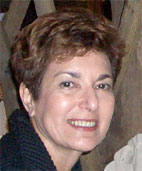 Following the family’s flight to India, Mira grew up in Palestine, living through tumultuous years leading to Israeli independence in 1948 and narrowly escaping the Ben Yehuda Street bombing that year which killed fifty-six people. The family’s move to Cyprus proved little safer: the island was in the grip of the EOKA guerilla campaign whose aim was union with Greece. But they settled happily in Nicosia and after an education at a Catholic convent school run by French nuns Mira took her first job with the Cyprus Treasury.
Following the family’s flight to India, Mira grew up in Palestine, living through tumultuous years leading to Israeli independence in 1948 and narrowly escaping the Ben Yehuda Street bombing that year which killed fifty-six people. The family’s move to Cyprus proved little safer: the island was in the grip of the EOKA guerilla campaign whose aim was union with Greece. But they settled happily in Nicosia and after an education at a Catholic convent school run by French nuns Mira took her first job with the Cyprus Treasury.
When the family moved to London in 1964 Mira enjoyed a varied career, including a time working in the visa section of the American Embassy and meeting many celebrities and rock stars of the day. After a period with Club Mediterrannée at their London office she held an executive position with Thomson Holidays for a number of years. In 1976 she founded a successful travel agency in Fleet Street called Parador Travel, together with her husband Tony. They went on to become successful hotelier-winemakers in Tuscany.*
Tony Rocca
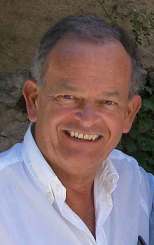 Tony was born in the suburbs of Manchester, England, the great-grandson of an Italian immigrant from Genoa whose own son — Tony’s grandfather — was closely identified with Manchester United for over forty years. In 1902 he actually gave the club its name.
Tony was born in the suburbs of Manchester, England, the great-grandson of an Italian immigrant from Genoa whose own son — Tony’s grandfather — was closely identified with Manchester United for over forty years. In 1902 he actually gave the club its name.
Tony grew up in England and was educated at Rossall School, Fleetwood. At the age of seventeen he joined a local paper in Stockport and has been writing for a living almost ever since. Aged twenty, he spent a year in Greece as associate editor of an English-language daily, the Athens News, while acting as local correspondent for the London Sunday Express — his first big break into Fleet Street.
He graduated to the Daily Mail in London where he worked for ten years, some of which were spent as a correspondent in New York. Then followed a further ten years in London with The Sunday Times as reporter, feature-writer and foreign correspondent (Greece and Cyprus being his speciality). His fifteen minutes of fame came with the demise of Sir James Goldsmith’s Now! magazine which he joined as deputy news editor on the very morning it closed and became Then! Next came a brief period as features editor of the Mail on Sunday.
In 1982 Tony and Mira decided to live abroad. They sold the travel agency and he spent several years freelancing from France and Italy. His articles appeared in most British national newspapers as well as The New York Times and Reader’s Digest. For a while he was European Editor of Travel Holiday magazine (USA).
____________________________
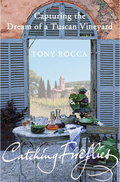
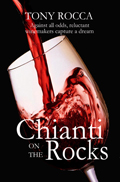 * Tony and Mira’s world changed dramatically in 1989 when they bought a ruined farmhouse in Tuscany and spent the next thirteen years grappling with bureaucracy, the business of making wine and being host and hostess to hundreds of guests who rented their holiday accommodation. The venture got off to a disastrous start but eventually became a great success — as did their wine. Complete novices, they were awarded 93 points (out of 100) by wine guru Robert Parker for their very first vintage. Tony told the story of the pitfalls and adversity that can confront the ‘good life’ novices in his first book, Catching Fireflies, published in 2004, reprinted in paperback in 2005. His latest book (2012), Chianti on the Rocks, is a greatly enhanced version now downloadable in Kindle form containing many new chapters including a section on winemaking as beginners. Wine wasn’t the reason they packed their bags and left a comfortable life in London to go and live in Chianti – but they were obliged to get into the business when bankruptcy threatened, and Tony exposes the depths of corruption at the bank that tried to drag them down. A YouTube slideshow sets the scene. See all of Tony’s books, including his first novel You Send Me, on his website www.tonyrocca.com
* Tony and Mira’s world changed dramatically in 1989 when they bought a ruined farmhouse in Tuscany and spent the next thirteen years grappling with bureaucracy, the business of making wine and being host and hostess to hundreds of guests who rented their holiday accommodation. The venture got off to a disastrous start but eventually became a great success — as did their wine. Complete novices, they were awarded 93 points (out of 100) by wine guru Robert Parker for their very first vintage. Tony told the story of the pitfalls and adversity that can confront the ‘good life’ novices in his first book, Catching Fireflies, published in 2004, reprinted in paperback in 2005. His latest book (2012), Chianti on the Rocks, is a greatly enhanced version now downloadable in Kindle form containing many new chapters including a section on winemaking as beginners. Wine wasn’t the reason they packed their bags and left a comfortable life in London to go and live in Chianti – but they were obliged to get into the business when bankruptcy threatened, and Tony exposes the depths of corruption at the bank that tried to drag them down. A YouTube slideshow sets the scene. See all of Tony’s books, including his first novel You Send Me, on his website www.tonyrocca.com
